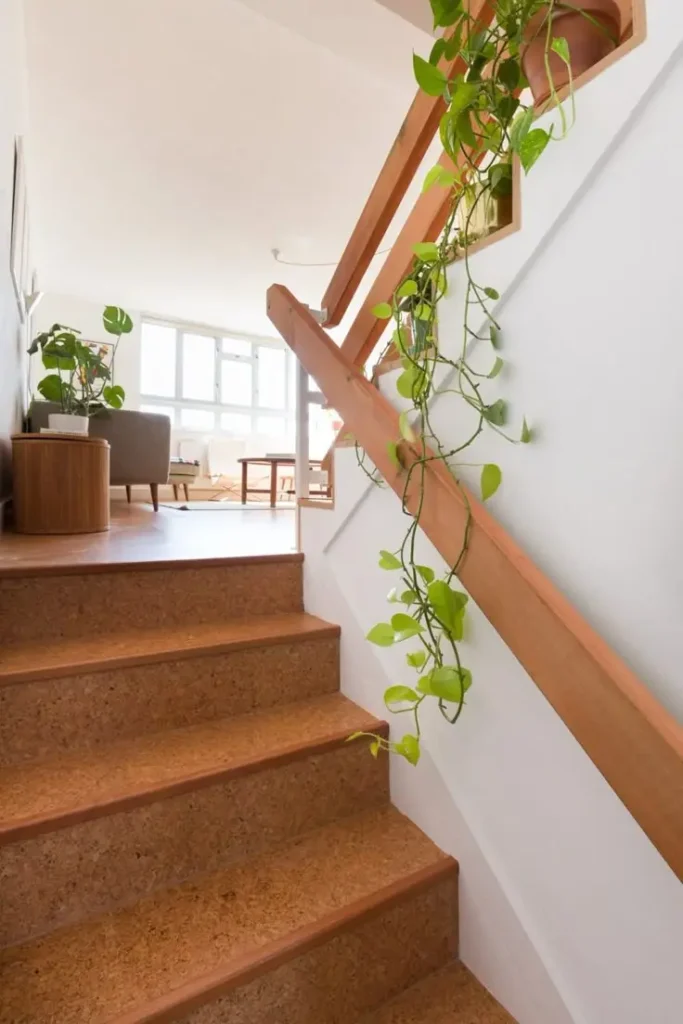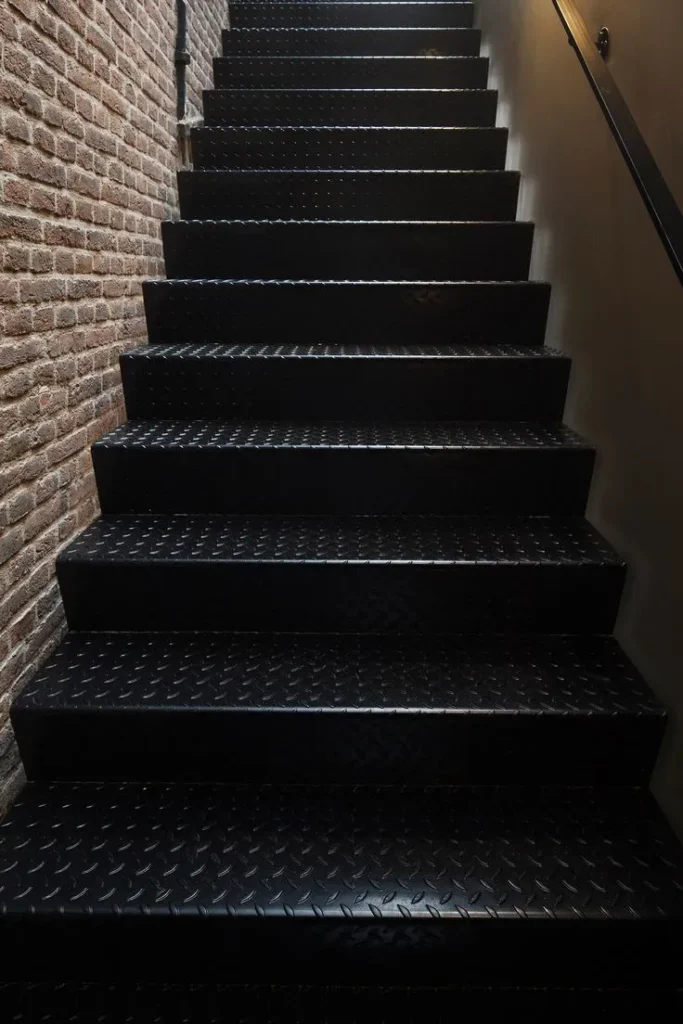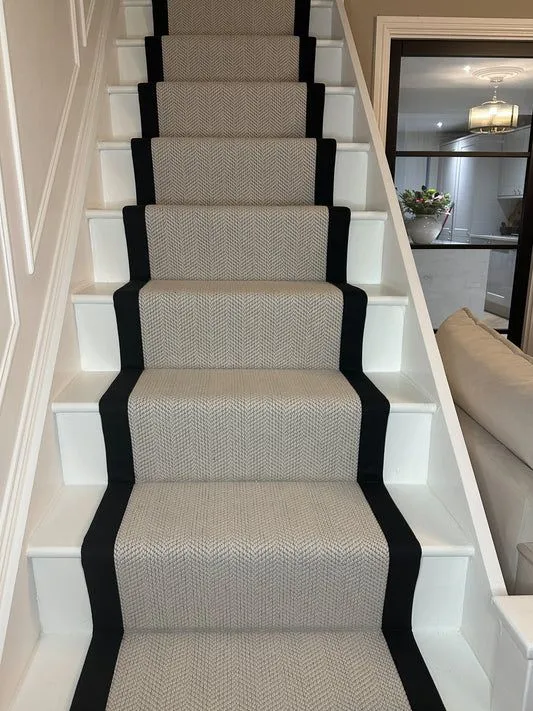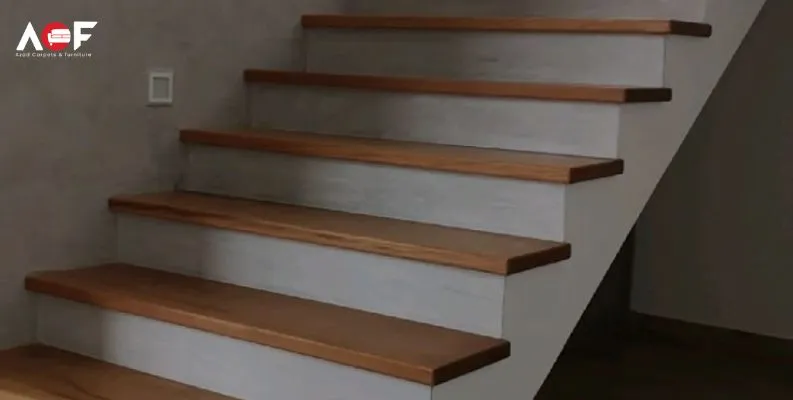9 Affordable Stair Flooring Ideas
Changing your staircase need not be a costly project. The appropriate, affordable stair flooring ideas will improve the appearance and use of your staircase without going broke. Here are some reasonably priced choices worth thought:
1. Laminated flooring: Affordable Luxuriousness
Those looking for the appearance of hardwood without the related cost often choose laminate flooring. It comes in several finishes and styles, is robust, and is quick to install.

Pros
- Cost Effective: Affordably less than conventional hardwood.
- Durable: Resilient against dents and scrapes.
- Variety: Variations abound in both patterns and hues.
Cons:
Moisture sensitivity: Should too much moisture be present, it might warp.
Noise: Under appropriate underlayment, it may provide a hollow underfoot sound.
Installation Tip:
Make sure every plank is well attached to stop movement and other risks.
2. Carpeted Stairs: Comfort and Safety
Households with youngsters or older adults would find carpet runners perfect as they provide a mix of comfort and safety. Their covering of the stair center leaves the borders visible, which may be a chic accent.

Pros:
Safety: Gives grip, therefore lowering the chance of falls.
Comfort: Soft underfoot lower noise.
Versatility: Readily interchangeable and in many designs.
Cons:
Maintenance: Maintenance calls for consistent cleaning to stop dirt accumulation.
Durability: Over time, it may exhibit wear in very traffic-heavy places.
Installation Tip:
Underlying the runner with non-slip pads will help to keep it in place and stop mishaps.
3. Vinyl Flooring: Adaptable and Water Resistant
Vinyl flooring’s affordability and resilience are well-known traits. Contemporary vinyl choices might seem like natural materials like stone or wood.

Pros:
Water-resistant: Fits places likely to be damp.
Durable: Can resist intense foot traffic.
Easy maintenance: Simple cleaning with consistent sweeping and mopping guarantees easy upkeep.
Cons:
Look: It might not be as upscale as natural materials.
Installations: The subfloor needs to give it a smooth look.
Installation Tip:
Choose premium vinyl to guarantee a lifetime and a more accurate look.
4. Painted Stairs: Budget-Friendly and Customizable
Painting your staircase might be a reasonably priced solution. This is a great do-it-yourself project that permits total customization.

Pros:
Affordable: Calls for little materials overall.
Customizable: Customize any color or pattern to complement your furniture.
Easy touch-ups: Simple to refinish should scuffs or worn show show.
Cons:
Durability: May call for frequent touch-ups in heavily traffic areas.
Preparation: Before installation, sand and prime well.
Installation Tip:
Using premium, slip-resistant paint will help to improve lifetime and safety.
5. Cork Flooring: Eco-Friendly Comfort for Your Stairs
Cork flooring is an environmentally sustainable choice with a distinctive appearance and feel. It’s soft underfoot and naturally insulates.

Pros:
Comfort: Cushioned feel lessens joint and foot pressure.
Insulation: Naturally blocks against temperature swings and noise.
Eco-friendly: Derived from sustainable resources.
Cons:
Durability: Might be easily scratched and dented.
Maintenance: Needs sealing against moisture.
Installation Tips:
Applying a protective sealant will help to increase durability and simplify cleaning.
6. Rubber Flooring: Safe, Durable, and Built to Last
Rubber flooring is standard in gyms and businesses and is an excellent choice for staircases because of its slip-resistant qualities.

Pros:
Safety: Shows excellent grip, therefore lowering the fall risk.
Durable: Long-lasting and wear-resistant durability.
Water Resistant: Perfect for places sensitive to moisture: waterproof.
Cons:
Aesthetic limitations: Fewer design choices than in wood or laminate reflect aesthetic restrictions.
Odor: May first smell strongly like rubber.
Installation Tips:
Rubber stair steps offer increased safety and simple installation.
8. Material Combination: Creating Your Style by Mixing and Matching
For those looking for a distinctive staircase design, consider combining and matching elements to provide a visually arresting and customized appearance. Combining many flooring materials, including hardwood for treads and ornamental tile for stair risers, will create a remarkable, unique staircase that captures your style and inventiveness.

Pros:
Customizable: lets you complement your house décor by means of total personalizing.
Visually appealing: design results from this uniqueness and style.
Versatile: Choosing different materials for treads and risers will help you to combine durability with beauty.
Cons:
Planning required: Careful choosing is needed to provide a consistent appearance.
Installation difficulty: Installation might be more complex than with one material.
Installation Tip:
To keep a harmonic design, make sure the materials you use accentuate each other in both texture and color.
9. Hardwood Flooring: Timeless Elegance

A high-quality finish will increase lifespan, and stair nosing will protect edges and make the installation safer. Though it is more costly than other flooring choices, hardwood flooring offers a pleasing look that will last years to come. Wooden stairs are a terrific option if you wish to create a magnificent entry that will impress guests and provide your property character. Outline the advantages and disadvantages of this work.
Pros:
Timeless Appeal: The flexibility of hardwood flooring to accentuate a variety of home styles accentuates its timeless beauty.
Durability: Regular cleaning and oiling help to increase the lifetime of hardwood stairs by decades.
Increases Home Worth: Gets more. Hardwood flooring is a high-end improvement that will increase the value of your house should you decide to sell it.
Very adaptable: To easily complement any design, choose from a large variety of wood kinds, dyes, and finishes.
Cons:
Higher Cost: Hardwood comes more expensive than substitutes like laminate and vinyl.
Slippery Surface: Hardwood stairs run the risk of becoming hazardous without non-slip coatings or treads.
Requires Maintenance: Constant refining is essential to maintain appearance and stop wear and tear.
Dampness Sensitive: Extended interaction with wetness might lead to deterioration or warping.
Installation Tip:
A good polish will extend lifespan; stair nosing will guard edges and provide a safer installation.
Cost Comparison
| Flooring Type | Average Cost per Square Meter |
| Laminate Flooring | £6 – £14 |
| Carpet Runners | £10 – £30 |
| Vinyl Flooring | £20 – £50 |
| Painted Stairs | £5 – £15 |
| Cork Flooring | £30 – £70 |
| Rubber Flooring | £40 – £80 |
| Mix and Match Flooring | Varies widely |
| Hardwood Flooring | £50 – £100 |
| Bamboo Flooring | £40 – £80 |
Frequently Asked Questions
- For staircases, what sort of flooring would be most suited?
Carpet is the perfect choice for staircases because of its soft, cushiony feel and robustness. Short fibers feel good and withstand wear and tear from individuals ascending and descending stairs.
- Which flooring is more straightforward to put on stairs?
Laminate flooring is the easiest to install on stairs, thanks in large part to its durability and resilience. Laminate installation is quick and easy, so your new stairs will be ready in no time.
- What flooring is ideal for stairs and a landing?
Laminate flooring is the best option for landings and stairs because it is sturdy, reasonably priced, and easy to maintain.
- Which factors should direct my choice of stair flooring?
Select visually pleasing, safe, durable, and easily maintained stair flooring for your home. Make sure the material, color, and texture make cleaning simple and that it is slip-resistant.
- Which are some rather known stair flooring options?
Because of its reasonably low cost and wide range of colors, textures, and patterns, laminate flooring is a popular choice for stairs.
Conclusion
Changing your staircase doesn’t have to be a significant expense. Every homeowner may find a solution, whether their taste is for laminate flooring, carpet runners, or tile and marble flooring.
Related topics:
A Complete Step-by-Step Guide on How to Measure Stairs and Landing for Carpet
How Much Does Carpet Fitting Cost? A Detailed Cost Guide
A Step-by-Step Guide to DIY Installation of Wooden Wall Paneling in Your Home


Comments are closed